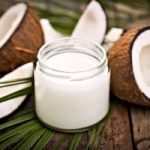How to Choose the Best Coconut Oil

Are you looking for the best coconut oil?
Coconut oil has grown in popularity. It’s sold under a variety of names, such as virgin, extra virgin, fully-refined and unrefined.
So with all these different kinds to choose from, how to you pick the best one?
I discovered the health benefits from using coconut oil many years ago and have sampled and tested many different products. While I’m no expert, I believe I can help you choose the best type.
Here we’ll take a closer look at different types of coconut oil products and their advantages and disadvantages to each type.
Guide to Different Types of Coconut Oil
What are Cold-Pressed Coconut Oils?
Cold-pressed coconut oils are made by scooping fresh coconut meat out of the shell. The meat is then crushed in a press to extract the coconut milk.

Freshly chopped coconut
There is no heat or chemicals used to extract the milk. The milk is then left to sit for a few days to allow the oils to naturally separate.
Cold-pressed coconut oils are also called virgin or non-refined. There’s no heat or chemicals used during the entire process to make the oil.
Many natural health advocates claim this is the best form of coconut oil because it contains the highest amount of natural fatty acids and nutrients that haven’t been degraded or denatured in any shape or form.
All virgin, cold-pressed oils will have a firm, creamy texture at room temperature, but will become a clear liquid at warmer temperatures. They’ll also taste and smell just like the coconut plant!
What are Refined Oils?
Refined coconut oils are also known as non-virgin or RBD oils. RBD means refined, bleached and deodorized because this is the processing method many manufacturers will use to make the oil.
Most refined oils are made from dried-out coconut meat, also known as copra. Older coconuts that have fallen from the trees can also be used as copra.
So for these types of products, you’re not using freshly picked coconut meat to make the oil.
The dried copra is then shipped to factories where it’s bleached, deodorized and even steamed to make a highly refined oil.
Refined coconut oils will also be white like cold-pressed oils, but they won’t have any scent because many of the nutrients have been removed from the processing and heat.
Advantages:
Refined coconut oil is good for cooking and baking where you don’t want any added coconut flavor or scent.
Disadvantages:
Lower in nutritional and antioxidant value due to using older, dried coconut meat
These aren’t considered a completely natural oil due to it being exposed to many levels of processing
Is Cold-Pressed Better Than Refined?
According to a study on the Chemical Characterization of Cold-Pressed Gourmet Oils, cold-pressed coconut oils were shown to contain the highest amounts of the lauric acid and lowest levels of pro-oxidants.
Lauric acid is a medium chain fatty acid commonly found in coconut oil. It’s been shown to have antimicrobial properties and is known for raising HDL (healthy) cholesterol levels.
And another study, Comparing the Antioxidant Capacity and Phenolic Acids of Virgin Coconut Oils concluded that cold-pressed oils showed the highest anti-oxidant activity, compared to refined coconut oils.
Advantages:
Cold-pressed oils retain the highest amount of healthy fatty acids and antioxidants that are usually damaged when exposed to heat processing.
Retains the natural flavor, aroma and nutritional value
No exposure to heat, bleach or chemicals during processing
Disadvantages:
Can be tricky to cook with they may not react well to really high cooking temperatures
Cooking with cold-pressed oils may leave an unwanted coconut flavor or scent to your dishes
Is There a Difference Between Virgin and ‘Extra-Virgin’ Oils?
Some companies may try to sway you into thinking that an extra-virgin is more pure than virgin coconut oils. In my opinion, there’s no difference.
There’s no regulatory body in the coconut oil industry that sets standards for virgin or extra virgin.
Instead of paying more for a ‘premium’ extra-virgin coconut oil, just buy virgin and say yourself a few dollars.
VERDICT: There’s no difference between virgin and extra virgin. Save your money and buy only virgin oils.
What are Fractionated Coconut Oils?
According to Harvard School of Public Health, coconut oil is 100% fat, with 80 – 90% saturated fat. Since coconut contains saturated fats, it’s a solid at room temperature and will liquefy at warmer temperatures.
Coconut oil also contains several types of fatty acids. These fatty acids molecules are be connected by long, medium and short fatty acids chain that have different melting points.
Fractionated coconut oils are a made by a process called ‘fractionation’. They may use a variety of heating and cooling methods to remove certain types of fatty acids.

Fractionated coconut oils come as a clear liquid oil
The result is a pure clear oil that’ll stay liquid in the fridge. They also won’t have any coconut flavor or scent like the cold-pressed oils.
I consider these a ‘lite’ version of regular coconut oils because you don’t get the complete fatty acid profile.
Some of these products may or may not contain the same amounts of lauric acid and other medium chain fatty acids as a virgin coconut oil.
You can also get fractionated coconut oils as Food-Grade and Non-Food Grade.
Food-grade oils are good for cooking, baking and frying since they have a high smoke point and won’t affect the flavor of your dishes.
Non-food grade oils ideal for hair and body care. They’ll have a much lighter texture and may absorb easier into your skin or hair. You also won’t get that familiar coconut scent.
Advantages:
Fractionated oils have a lighter texture. This may make them more suitable in situations where you want a lighter oil, such as applying it to your skin or hair.
Ideal for cooking or baking where you want a healthy fat in the recipe, but don’t want any coconut flavor or scent added to it
Has a higher smoke point than virgin oils so you have a lower risk of causing heat damage to the oil when cooking with it.
Disadvantages:
Doesn’t provide the full antioxidant nutritional value of a virgin cold-pressed oil.
Choose Organic or Non-Organic?
A true organic coconut oil is made from plants that hasn’t been genetically-modified.
Organic coconut plants are grown without any exposure to any harmful chemicals or pesticides. The oil shouldn’t contain any preservatives or other by-products.
Many of these plants are farmed using sustainable methods that are friendly to the environment, yet also profitable for the farmers.
All organic products should come with some type of ‘organic-certified’ seal or other type of regulatory standard to ensure your product really is organic.
While some organic products may cost more than non-organic, I haven’t found a significant difference between organic and non-organic coconut oils.
Advantages:
NO synthetic products, pesticides or herbicides were used to grow the coconut plants
NO exposure to genetically modified foods
Working environment for organic farming is healthier for the farmers
Look for USDA-Certified Organic seals or other regulatory certifications to ensure you’re getting organic coconut oil.
Disadvantages:
May cost slightly more than non-organic products
Has to go through a certification process
Coconut Oil Capsules vs Bottle Liquids
Should you buy coconut oil capsules or the bottled oils? Your choice will depend on what you’re using the oil for.
In our article, Pros and Cons to Capsules vs Bottle Oils, we discussed how main advantage is they’re portable and you don’t have to taste the coconut oil.
However, the main disadvantage is that capsules may only come in certain dosage sizes and you may not have as many product choices compared to the raw coconut oils.

Review of Popular Coconut Oil Products
The following is a few products that I’ve actually tried and tested.
Many of them are organic, virgin coconut oils made by different manufacturers.
Garden of Life Coconut Oil Review
 – this product claims to use only fresh coconuts. It’s reported to be made in the Philippines and imported into North America by Garden of Life. The meat is shredded, cold-pressed and milked. The milk is then fermented to produce a 100% virgin oil.
– this product claims to use only fresh coconuts. It’s reported to be made in the Philippines and imported into North America by Garden of Life. The meat is shredded, cold-pressed and milked. The milk is then fermented to produce a 100% virgin oil.They claim it’s a completely vegan and organic product that hasn’t been subjected to any hydrogenation, bleach, refined or deodorized ingredients. It usually comes packaged in a glass jar for freshness. I think this product is great for cooking, as well as skin and hair care. It has also received many positive online reviews.
Spectrum Naturals Coconut Oil Review
– this one is made by a large corporation that produces a line of cooking oils. They claim this particular product is made by expeller-press without the use of heat. It’s reported to be a completely, unrefined product. I did find this particular oil had less flavor than some other brands; however, I did like to use it for cooking and frying.
 – This is one of my favorite cold-pressed oils and it’s Certified USDA Organic. It’s also made from freshly-picked plants, just like Garden of Life and they claim the meat is pressed immediately after harvesting. They claim to not use any bleach, high heat, fermenting, hydrogenation, bleaching or deodorizing to produce it. I found it had a strong coconut scent and tasted quite ‘clean’. I think this is one of the best oils that provides excellent flavor and taste.
– This is one of my favorite cold-pressed oils and it’s Certified USDA Organic. It’s also made from freshly-picked plants, just like Garden of Life and they claim the meat is pressed immediately after harvesting. They claim to not use any bleach, high heat, fermenting, hydrogenation, bleaching or deodorizing to produce it. I found it had a strong coconut scent and tasted quite ‘clean’. I think this is one of the best oils that provides excellent flavor and taste.
Tropical Traditions Product Review
– I got this product on-line from Brian Shilhavy, the founder of Tropical Traditions. It’s certified USDA Organic product is made in the Philippines using the traditional practices followed by villagers. This is another one of my favorites; it has a rich creamy texture and nourishing flavor.
Swansons Vitamin Certified 100% Organic Extra Virgin Coconut Oil
– Swansons Vitamins is a large on-line nutritional supplement retailer. I picked this product up at Swanson’s flagship store in Fargo, North Dakota. I found it’s affordably priced at about $7.99 for 16 ounces (454 grams solid). This one is also USDA Certified Organic and made by cold-pressing and has no hydrogenated fats. For the price I paid for this, I was actually quite surprised at the high quality of this oil. I found it had a mild coconut flavor with a light mouth feel.
Of course, the above list is by no means complete and I’m sure you’ll also find many other fine quality products that I haven’t covered here.
If you’re using coconut oil as a healthy oil, I would recommend using only cold-pressed, virgin organic coconut oils. This type of product will provide the highest amount of healthy fatty acids and antioxidant properties.
Where to Buy Coconut Oils:
The best places I was able to find these products is in a local health food store or online.
I found that the most common size is 16 ounce jars that ranged in prices from $10 to over $20. However, some manufacturers do offer large pails that can go for a few hundred dollars.
If you plan on using this product on a daily basis, I think you may be better off purchasing in bulk to save money. Just be aware that you may have to pay higher shipping costs to ship bulkier items in the mail.
To get the best value for your dollar, always compare the price per ounce. Simply divide the cost by the number of ounces or grams to calculate how much you’re actually paying by weight.
Home > Coconut Oil Home Page > Your Complete Guide to Buying the Best Coconut Oil





